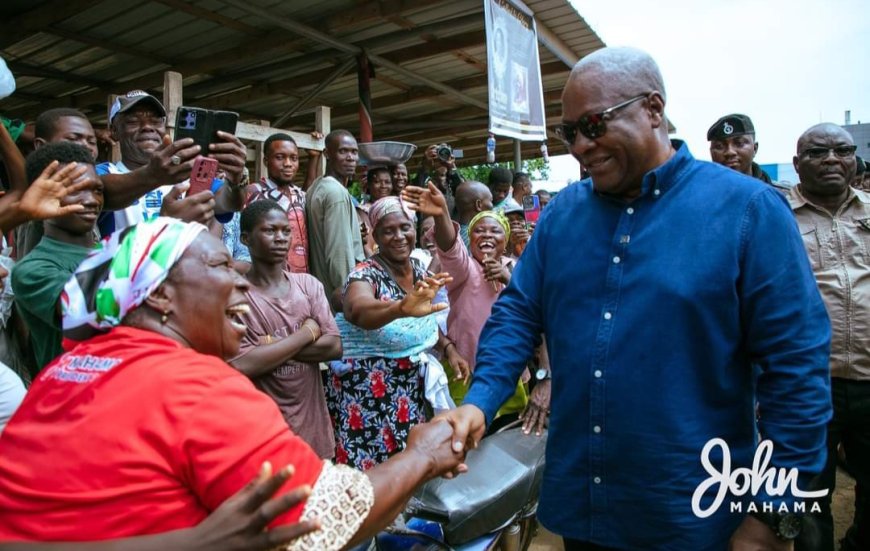John Mahama's Women's Development Bank

John Dramani Mahama, the flagbearer of the National Democratic Congress (NDC), has announced the establishment of the Women's Development Bank.
The bank is set to play a crucial role in supporting women entrepreneurs and traders by providing interest-free loans, making financial resources more accessible to women across Ghana. This article delves into the details of the Women's Development Bank, its goals, implementation strategies, and potential impact on Ghanaian society.

The Role of the Women's Development Bank
The Women's Development Bank is designed to address the unique financial challenges faced by women entrepreneurs and traders. Women often encounter significant barriers in accessing capital due to systemic inequalities, lack of collateral, and high-interest rates. By providing interest-free loans, the Women's Development Bank aims to:
-
Increase Financial Inclusion: By offering interest-free loans, the bank will help women who are traditionally excluded from formal financial systems to access necessary funds to start and grow their businesses.
-
Support Women Entrepreneurs: The bank will specifically target women entrepreneurs and traders, providing them with the financial resources needed to invest in their ventures, purchase inventory, and expand their operations.
-
Promote Economic Empowerment: By empowering women financially, the bank aims to contribute to the broader economic development of the country. Women who are financially independent are more likely to invest in their families and communities, leading to overall societal benefits.
Key Features of the Women's Development Bank
-
Interest-Free Loans: The most significant feature of the Women's Development Bank is the provision of interest-free loans. This initiative will relieve women from the burden of high-interest debt, enabling them to invest more in their businesses.
-
District and Market Area Presence: The bank will have branches in all districts and major women market areas across Ghana. This widespread presence will ensure that financial services are easily accessible to women, regardless of their location.
-
Tailored Financial Products: The bank will offer a range of financial products tailored to the needs of women entrepreneurs and traders. These products will include microloans, business development loans, and emergency funds.
-
Capacity Building and Training: In addition to providing loans, the bank will offer training and capacity-building programs to help women entrepreneurs enhance their business skills, financial literacy, and management capabilities.
-
Support Services: The bank will provide additional support services, such as business advisory, mentorship programs, and networking opportunities, to help women grow and sustain their businesses.
Implementation Strategy
-
Establishment of Branches: The bank will be strategically positioned in all districts and significant women market areas to ensure maximum accessibility. Each branch will be equipped with trained staff to provide tailored financial services to women entrepreneurs.
-
Partnerships with NGOs and Women's Groups: The bank will collaborate with non-governmental organizations (NGOs) and women's groups to identify potential beneficiaries and provide holistic support to women entrepreneurs.
-
Awareness Campaigns: To ensure widespread knowledge of the bank's services, comprehensive awareness campaigns will be launched. These campaigns will use various media channels to reach women across the country, informing them about the availability of interest-free loans and other services.
-
Monitoring and Evaluation: A robust monitoring and evaluation framework will be established to track the bank's performance and impact. Regular assessments will be conducted to ensure that the bank meets its objectives and provides valuable support to women entrepreneurs.
Potential Impact on Ghanaian Society
-
Economic Growth: By providing financial resources to women entrepreneurs, the Women's Development Bank will stimulate economic activity and growth. Women-owned businesses will contribute to the overall GDP and create job opportunities.
-
Poverty Reduction: Access to interest-free loans will enable women to lift themselves and their families out of poverty. Financially empowered women are more likely to invest in education, healthcare, and other essentials, leading to improved living standards.
-
Gender Equality: The establishment of the Women's Development Bank is a significant step toward achieving gender equality in Ghana. By addressing the financial barriers faced by women, the bank will promote equal opportunities and empower women to take active roles in the economy.
-
Community Development: Women who are financially empowered are more likely to contribute to community development initiatives. The bank's support will enable women to invest in local projects, fostering community growth and resilience.
Conclusion
John Mahama's Women's Development Bank is a visionary initiative that aims to transform the economic landscape of Ghana by empowering women entrepreneurs and traders. By providing interest-free loans and support services, the bank will address the financial challenges faced by women, promote economic growth, reduce poverty, and advance gender equality. With careful planning, strategic partnerships, and robust implementation, the Women's Development Bank has the potential to create lasting positive change for women and society as a whole in Ghana.





